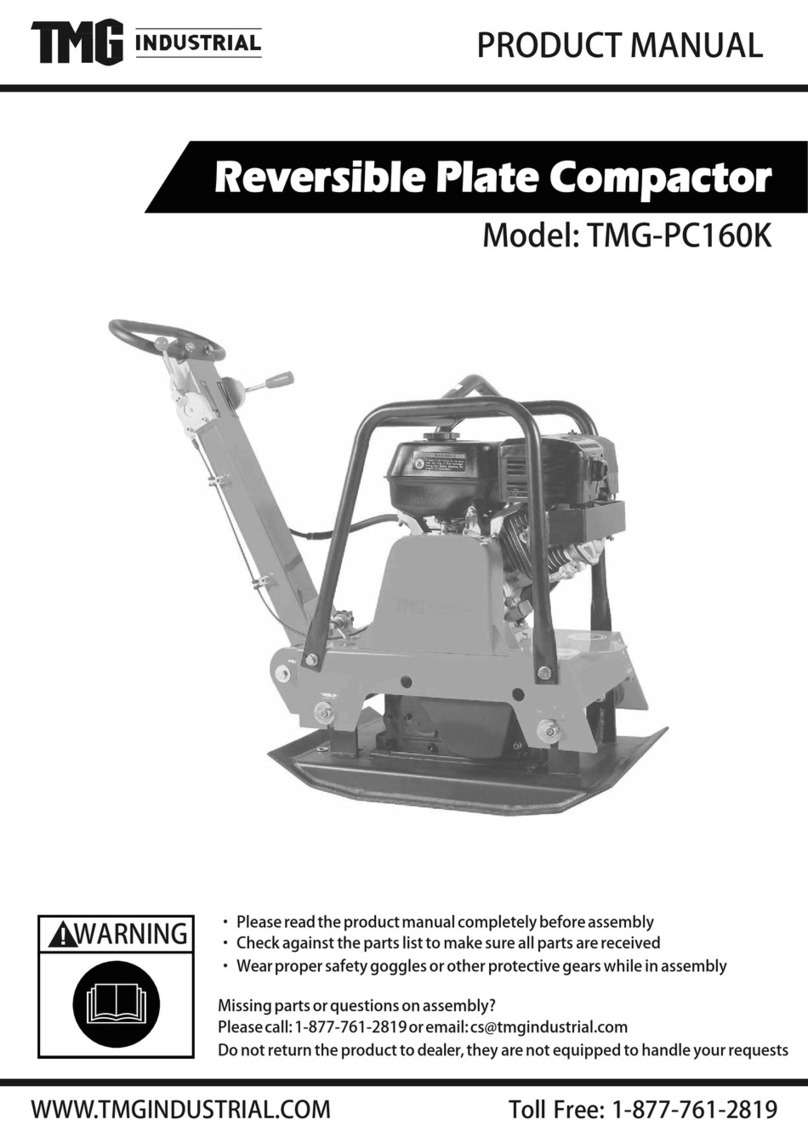
Do not start to operate the product again until you
know that it is safe to continue.
• Put the product in an upright position before you
start it.
• Do not sit on the product.
• Keep your feet away from the rammer shoe.
• Do not operate the product with your leg on the
handle.
• Do not operate the product on solid rock, hard
concrete or other hard surfaces. There is a risk of
injury and damage to the product.
• Do not operate the product on a slope.
• When you operate the product in a trench or other
small space, make sure that the rammer shoe can
move freely. If the space is too small for the rammer
shoe, there is a risk of damage to the product. There
is also a risk of injury from sudden movements in the
product.
• If the product falls on its side during operation, stop
the engine before you lift the product to upright
position.
Vibration safety
WARNING: Read the warning instructions
that follow before you use the product.
• During operation of the product, vibrations go from
the product to the operator. Regular and frequent
operation of the product can cause or increase the
degree of injuries to the operator. Injuries can occur
in fingers, hands, wrists, arms, shoulders, and/or
nerves and blood supply or other body parts. The
injuries can be debilitating and/or permanent, and
can increase gradually during weeks, months or
years. Possible injuries include damage to the blood
circulation system, the nervous system, joints, and
other body structures.
• Symptoms can occur during operation of the product
or at other times. If you have symptoms and
continue to operate the product, the symptoms can
increase or become permanent. If these or other
symptoms occur, get medical aid:
• Numbness, loss of feeling, tingling, pricking,
pain, burning, throbbing, stiffness, clumsiness,
loss of strength, changes in skin color or
condition.
• Symptoms can increase in cold temperatures. Use
warm clothing and keep your hands warm and dry
when you operate the product in cold environments.
• Do maintenance on and operate the product as
given in the operator's manual, to keep a correct
vibration level.
• The product has a vibration damping system that
decreases the vibrations from the handles to the
operator. Let the product do the work. Do not push
the product with force. Hold the product at the
handles lightly, but make sure that you control the
product and operate it safely. Do not push the
handles into the end stops more than necessary.
• Keep your hands on the handle or handles only.
Keep all other body parts away from the product.
• Stop the product immediately if strong vibrations
suddenly occurs. Do not continue the operation
before the cause of the increased vibrations is
removed.
Dust safety
WARNING: Read the warning instructions
that follow before you use the product.
• Operation of the product can cause dust in the air.
Dust can cause serious injury and permanent health
problems. These are examples of such health
problems:
• The fatal lung diseases chronic bronchitis,
silicosis and pulmonary fibrosis
• Cancer
• Birth defects
• Skin inflammation
• Use correct equipment to decrease the quantity of
dust and fumes in the air and to decrease dust on
work equipment, surfaces, clothing and body parts.
Examples of controls are dust collection systems ans
water sprays to bind dust. Decrease dust at the
source where possible. Make sure that the
equipment is correctly installed and used and that
regular maintenance is done.
• Use approved respiratory protection. Make sure that
the respiratory protection is applicable for the
dangerous materials in the work area.
• Make sure that the airflow is sufficient in the work
area.
• If it is possible, point the exhaust of the product
where it cannot cause dust to go into the air.
Exhaust fumes safety
WARNING: Read the warning instructions
that follow before you use the product.
• The exhaust fumes from the engine contain carbon
monoxide which is an odourless, poisonous and very
dangerous gas. To breathe carbon monoxide can
cause death. Because carbon monoxide is odourless
and cannot be seen, it is not possible to sense it. A
symptom of carbon monoxide poisoning is dizziness,
but it is possible that a person becomes unconscious
without warning if the quantity or concentration of
carbon monoxide is sufficient.
• Exhaust fumes that you can see or smell also
contain carbon monoxide.
• Do not use a combustion engine product indoors or
in areas that do not have sufficient airflow.
1167 - 003 - 09.03.2020 5




































